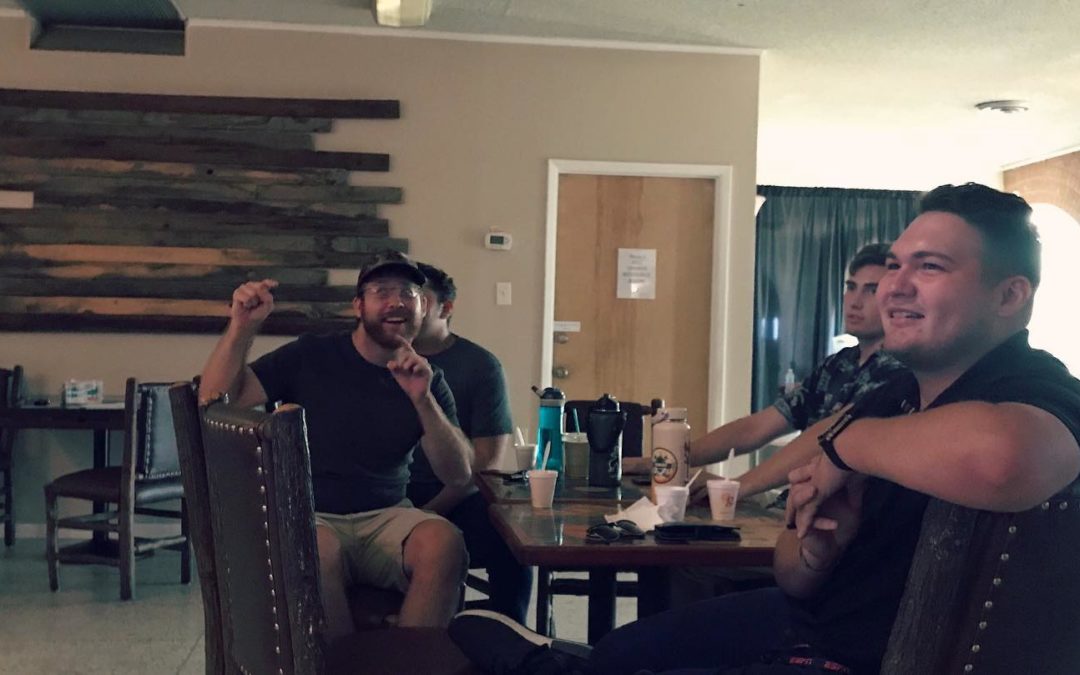Alienation. Loneliness. Isolation. Most people would agree these words do not describe human flourishing. Yet, so much of our culture appeals to the individualistic self. It is like going to the gym in Jim Gaffigan’s satire: “I want to look at myself while I work on myself. I should make a recording of myself so I can listen to myself while I look at myself while I work on myself as I leaf through a Self magazine and read about how myself can improve myself.” I live in the West, where the spirit of individualism is championed as a paramount virtue. Individuals pride themselves on being individualistic. Interestingly, I find the more individualistic that one becomes, the more lonely and isolated they feel.
Why have dense and diverse cities seemingly proven to be lonely wastelands for so many people? Why is it that even in many churches, you can be in a crowded room, yet feel alienated, isolated, and alone? It is because as God’s image bearers, we were created by community for community. We were made to belong.
Today, young professionals, hipsters, artists and developers are flocking to the cities to be a part of something larger than themselves. In our neighborhood, stakeholders are taking risks with a little bit of money and a big dream to do something meaningful. City planners, informed by the new urbanism, are seeking to restructure the way people interact and belong. Connectivity, walkability, and accessibility all aim at intersecting lives together to bring back the spirit of community, of belonging. Does the role of creating meaningful community belong to the developer? Does the role of creating meaningful community belong to the marketplace? Does it belong to the wealthy? To the powerful? Or, does the role of creating meaningful community belong to God, carried out through local communities where his children gather? This is important because whoever is shaping a community is also being shaped by the community. For our focus regarding discipleship, small groups are micro-communities comprised of covenant people who belong to God, belong to each other, and together welcome the stranger among them.
We were made to belong to God
Before we understand how we can experience community to the fullest, we first must understand who we are and whose we are. God created us out of the community of the Father, the Son, and the Holy Spirit, to enjoy communion with Him and with other image bearers that He created. He created us for Himself—to belong to Him. All of our identity is to be wrapped up in Him. Let’s face it, we live in a culture of individualism that makes it hard to fathom being completely identified with someone or something other than our self. God created us to participate in His life and the lives of others. Community is fundamental to being human.
The problem is that we are in a state of poverty. Our relationship with God has been broken. The Bible says that because of sin, we have been cut off from fellowship (sharing in life) with God (Romans 3:23). From the very first sin, Adam and Eve hid and communion was lost. This hiding in the shadows is owing to a false sense of self. Humans were made to walk and live in the light, unencumbered by the weight of shame, guilt, and falsehood. In the dark, there is deception, distortion of reality, isolation, alienation, and shame. The good news of Jesus is that He is the light that exposes who we really are in the presence of God, and the entry gate to the kingdom in which He rules and reigns. We can own up to the reality of who we truly are and surrender our false selves to the One who defeated sin and death through His perfect life, substitutionary death, and triumphant resurrection.
Not only is Jesus the entry gate to the Kingdom, He is the access by which we are changed and transformed by it. Our false-self story is now exposed and interpreted differently now that it is in the light. It is truly Coram Deo, “before the face of God.” The more we live in the light of His presence, the deeper the communion we enjoy with Him. The good news of Jesus is not simply an idea. Jesus is the entry gate through which we are redeemed and restored to come home to a loving Father and find our own identity. The Holy Spirit, indwelling us, communicates the loving fellowship of our Trinitarian God. Think about this—He communicates God to us! As we share in His life, He exposes the things which hinder our deeper communion and fellowship together. He gently, graciously heals our wounds and wraps us up in Himself, giving us the acceptance for which our souls long. It is not as if sharing our stories to God frees us from the memories, but God understands us. He gets us! It is a community relationship that He brings us into. We have life in Him, not in our ideas about Him. The more we live in this reality, walking in the light, sharing our stories of sin and struggles, pain and suffering (confession) to Him, the greater we experience the shalom of His presence and the sharing of His life. Is this not the invitation of the Gospel? We can own up to who we really are in the presence of God, who loves us beyond all measure. We don’t have to hide. Sin presses us to the margins and into the shadows, but Christ rescues us from the dark places of alienation and brings us into the light of His family. Christ died so that we can die to our individualistic false self, and live open and honestly in communion with Him.
We were made to belong to others
Following Jesus is primarily a corporate thing. It is both organic and planned. Christ died so that we can die to our individualistic false self, and live openly and honestly in communion with Him and with others. Community is God’s agent of change in our lives. It is a false statement to say, “All I need is the Holy Spirit and my Bible.” Because of our relational design we cannot change without the presence of others. Jesus spoke of our union with God, “I am the vine; you are the branches. Those who remain in me, and I in them, will produce much fruit. For apart from me you can do nothing” (John 15:5). This verse speaks of a deep and meaningful communion with Him and with those who are in Him. Once we turn from an alienated inward focus on the self to an outward focus on God, we experience reconciliation with God, and therefore cease turning away and begin turning toward Him. We turn from shame and falsehood, and turn to freedom and truth, experiencing shalom. To participate in Christ’s life is to participate in, with, and through His body.
Cities have rediscovered the importance of building environments and communities that engage the whole person in meaningful interaction. The church owns the identity of community, because God created it. How much more ought we to foster meaningful relationships where life-on-life interactions take place in the intersections where life exists? Just as developers consider where people live, work and play, churches must consider that life takes place within those environments. A transforming relationship is not generic or virtual; it is concrete and particular. There is a shift in our relational capacity when a particular person shows up in particular way in our life. Small groups are an intentional platform where these transformational relationships can be found.
We not only seek to shape our small groups with the presence of our lives, but our lives are shaped by them. Small groups are a piece of the local corporate gathering that includes the elements that are intrinsic to the whole—centrality of the Word, praying of the Word, sharing in the Word, and living out one another’s experience of the Word. As a family of diverse members, our individual gifts, talents and personalities are best expressed—and find their highest expression—within community.
We were made to love the stranger
Small Groups are like city gates. If strangers are going to feel welcomed, whether in a city or a church, where do they go? Where is hospitality valued? Restaurants? Hotels? Local retailers? Where are the gateways into a community? Does God care about this?
In her book, Making Room, Christine Pohl makes the point, “Hospitality is not so much a task as a way of living our lives and of sharing ourselves” (p.172). The breakdown of hospitality has decreased the degree of responsibility we have to each other. God welcomed and wanted us to be a part of His family. He pursued us. He listened to us. He was patient with us. His pursuit of us was not conditional. He was not attracted to us because of our beauty, status, or resources. He pursued us in spite of them. God made the kingdom accessible to the poor, broken, powerless, the hungry and the thirsty. Jesus was the gateway into the Kingdom. As a community of believers who have been transformed by the Gospel and continue to be transformed by it, we are to be actively proclaiming the accessibility of the kingdom to everyone.
Small groups, comprised of believers belonging to each other, who are diverse socio-economically, ethnically, generationally, and circumstantially, who are present and visible at intersections where lives exist, have an opportunity to demonstrate the hospitality of God as a witness of the kingdom so that others may enter in. Humans were made for this! Community is fundamental to who we are and what we were created for, namely, to know, to be known, and to make known the glory of Christ to the world. To be human is to belong—to God and to each other. Community teaches individuals how to be human. Being in it, we are transformed by it. And as a small group, a micro-community, we can pursue the stranger and bring them in to experience the One who created us for it.


Recent Comments